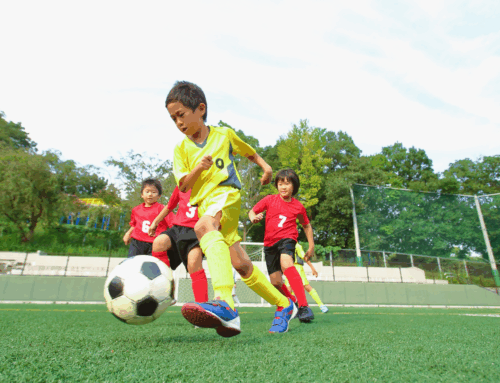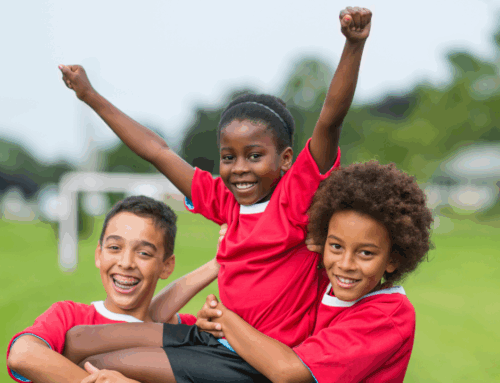Get our exclusive report. Download the iSport360 Club Switching Report Here – For Club Admins, Rec Leaders and Coaches.
The Comparison Trap In Youth Sports
The comparison trap in youth sports. You see it all of the time, parents comparing their kid’s growth and development to others on their team or in their age group. It is a massive challenge as a coach because you want your players to control the things they can control – other players aren’t one of them.
While it is natural for players to compare themselves to their teammates, opponents, or even professional athletes they admire, it can negatively impact the player. Whether they are comparing speed, skill, strength, or leadership, young athletes often measure their abilities against others. While comparison can sometimes fuel motivation, it can also lead to frustration, self-doubt, and burnout if not handled correctly.
Let’s reframe it where it fosters growth and not frustration.
The Natural Tendency to Compare
Comparison is a fundamental part of human nature. In sports, it can be especially pronounced because performance is constantly measured—through stats, playing time, wins, and losses. Young athletes often look at their teammates and wonder:
- “Why is she faster than me?”
- “How does he always score more goals?”
- “Why does the coach give them more playing time?”
These questions can create a mental cycle of self-doubt, making players feel like they’re falling behind. What you don’t want to do is frustrate the athlete so much that they start to lose confidence.
However, when approached the right way, comparison can be a powerful tool for self-improvement.
The Negative Side of Comparison
1. Lowered Self-Esteem
Constantly measuring oneself against others can make a young athlete feel like they’re never good enough. Instead of focusing on their own progress, they may dwell on what they lack, leading to frustration and discouragement. As confidence dips, it can show up on during a game or at practice. And sometimes it is hard for a coach to help players that are dipping in confidence.
2. Increased Anxiety and Pressure
When players fixate on outperforming others, they may feel an overwhelming pressure to be perfect. This can lead to performance anxiety, where they play out of fear rather than confidence. I see it all of the time, players are playing to not make a mistake or are so tight that they may burst.
3. Loss of Enjoyment
Sports are meant to be fun, but when comparison turns into an obsession, the joy of the game fades. Instead of celebrating small victories, players may only see what they haven’t achieved yet. When it isn’t fun, kids drop out.
4. Unhealthy Rivalries
A little competition is great, but unhealthy comparisons can create resentment toward teammates and opponents. Instead of working together, players may see others as threats rather than sources of inspiration. And you don’t want a negative culture to impact your team, you only win as unit.
Turning Comparison Into Motivation
While comparison can be damaging, it doesn’t have to be. When used correctly, it can help athletes push themselves, set goals, and stay motivated. Here’s how young athletes can reframe comparison in a healthy way:
1. Compare Yourself to Your Past Self
The most productive comparison an athlete can make is with their own past performance. Instead of focusing on whether they are as good as someone else, they should ask:
- “Am I better than I was last season?”
- “Have I improved my speed, accuracy, or endurance?”
- “What skills have I developed over time?”
Tracking personal progress shifts the focus from competition to self-improvement, making goals more attainable and rewarding. Celebrate the small wins along the way, players can measure themselves against THEMSELVES each season. This way they can see their hard work faster.
2. Use Others as Inspiration, Not as a Measure of Self-Worth
Instead of feeling threatened by a skilled teammate or opponent, young athletes should view them as a source of motivation. If a teammate is faster, ask, “What can I learn from them?” If an opponent has great footwork, study their technique and try to incorporate it into your own game.
This is a great way to improve, they see their teammates getting better and they know how they do that.
3. Understand That Everyone’s Journey is Different
Athletes develop at different rates. Some players hit growth spurts early, while others take longer to build strength and coordination. Just because someone is ahead now doesn’t mean they will always be. Consistency and hard work often matter more than early success.
I always say “trust the process”, it is a journey and the more you work consistently on your craft, the better you will become.
4. Set Personal Goals Instead of External Ones
Rather than setting a goal like “I want to be the best player on the team,” focus on personal development goals, such as:
- “I want to improve my free throw percentage by 10%.”
- “I want to increase my stamina so I can last longer in games.”
- “I want to improve my teamwork and communication skills.”
These goals keep the focus on self-growth rather than on outshining others. Use SMART goals, so make sure they are specific, measurable, attainable, results-oriented, and timely.
5. Celebrate the Success of Others
A great way to shift the mindset around comparison is to celebrate teammates’ successes instead of resenting them. If a teammate scores a winning goal, be happy for them. If someone improves dramatically, acknowledge their hard work.
This creates a positive team environment and reinforces the idea that success is not a zero-sum game—one person’s achievement doesn’t diminish another’s.
6. Recognize That Sports Are About More Than Just Talent
While natural ability plays a role in sports, so do effort, attitude, teamwork, and mental toughness. A less naturally talented player who works hard, stays disciplined, and maintains a positive mindset can surpass a more gifted athlete who lacks dedication.
Parents would be surprised on how players can succeed when they have some other skills like high work rate, discipline and positive energy.
The Role of Coaches and Parents
Coaches and parents play a crucial role in helping young athletes manage comparison healthily. Here’s how they can help:
- Encourage effort over results. Praise players for their work ethic, resilience, and improvement rather than just wins or stats.
- Help athletes set personal goals. Guide them in setting goals based on their own progress rather than external benchmarks.
- Model healthy comparison. Avoid making negative comparisons between players and instead highlight how they can learn from each other.
- Create a supportive team environment. Foster a culture where players lift each other up rather than tear each other down.
Wrap It Up!
Comparison is inevitable in youth sports, but it doesn’t have to be a negative force. When approached with the right mindset, it can fuel motivation, inspire growth, and build resilience. Young athletes should strive to be better than they were yesterday, use others as sources of learning, and remember that their journey is unique. By focusing on personal improvement rather than external competition, they can develop both as athletes and as individuals, finding fulfillment and confidence in their progress.
iSport360 is the only app that does it all for youth sports. For more information on what we do, click here.
About the author:
Amy Masters is a sports mom, coach, and club administrator. She has been coaching youth sports for more than 10 years. She started Jr Lions Field Hockey, the youth recreation program for the Hunterdon County community growing it from 40 players in year 1 to 150 players by year 3. A few years later, she saw the love and competitiveness grow then started Omega Field Hockey Club serving NJ and PA players. Before coaching, she was a collegiate field hockey player for Lock Haven University. In her spare time (lol), she is head of marketing for iSport360 and the co-editor of the Youth Sports Survival Guide. The Youth Sports Survival Guide is the largest youth sports newsletter in the world.
Learn more or request a demo of our youth sports software that is helping teams improve communication, organization and player development.
February 7, 2025






